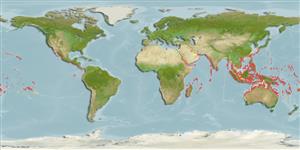Common names from other countries
Environment: milieu / climate zone / depth range / distribution range
पारिस्थितिकी
समुद्री प्रवाल-भित्ति संयुक्त; गहराई सीमा 2 - 30 m (Ref. 30874). Tropical; 32°N - 32°S
Indo-Pacific: East Africa to the Tuamoto Islands, north to southern Japan, south to New South Wales and Tonga.
आकार / वज़न / Age
Maturity: Lm ? range ? - ? cm
Max length : 24.0 cm TL पुल्लिंग / अलिंग; (Ref. 5372)
पृष्ठीय रीढ़ (सम्पूर्ण): 12; पृष्ठीय सौफट रेज़ (सम्पूर्ण): 24-27; गुदा कांटा 3; ऐनल सौफट रेज़: 17 - 19.
Occur in lagoon and seaward reefs with rich coral growth. Juveniles solitary; adults are often paired and occasionally found hovering side by side under tabular corals (Ref. 1602). Feed on bottom living animals (Ref. 6113), e.g. invertebrates associated with algal zones (Ref. 5503). Oviparous (Ref. 205). Form pairs during breeding (Ref. 205). Minimum depth reported taken from Ref. 30874.
Life cycle and mating behavior
परिपक्व अवधि | पुनरुत्पत्ति | मछलीऔ का अंडे देना | अंडे | Fecundity | लार्वा
Form pairs during breeding (Ref. 205).
Steene, R.C., 1978. Butterfly and angelfishes of the world. A.H. & A.W. Reed Pty Ltd., Australia. vol. 1. 144 p. (Ref. 4859)
IUCN Red List Status (Ref. 130435)
CITES (Ref. 128078)
Not Evaluated
Threat to humans
Harmless
Human uses
जलजीवालय: व्यापारिक
अधिक जानकारी
संदर्भजलीयकृषिजलीयकृषि रूपरेखाखींचआनुवंशिकीElectrophoresesहैरेटिबिलटीबीमारीप्रक्रमणMass conversion
साधन
Special reports
Download XML
इंटरनेट स्रोत
Estimates based on models
Preferred temperature (Ref.
115969): 24.7 - 29.3, mean 28.3 (based on 3917 cells).
Phylogenetic diversity index (Ref.
82804): PD
50 = 0.5039 [Uniqueness, from 0.5 = low to 2.0 = high].
Bayesian length-weight: a=0.02042 (0.01294 - 0.03221), b=3.05 (2.92 - 3.18), in cm Total Length, based on LWR estimates for this species & (Sub)family-body (Ref.
93245).
Trophic level (Ref.
69278): 3.5 ±0.37 se; based on food items.
लौटाव (Ref.
120179): ऊंचा, न्यूनतम जनसंख्या दुगनी समय अवलागत 15 महीने। (Preliminary K or Fecundity.).
Fishing Vulnerability (Ref.
59153): Low vulnerability (14 of 100).
